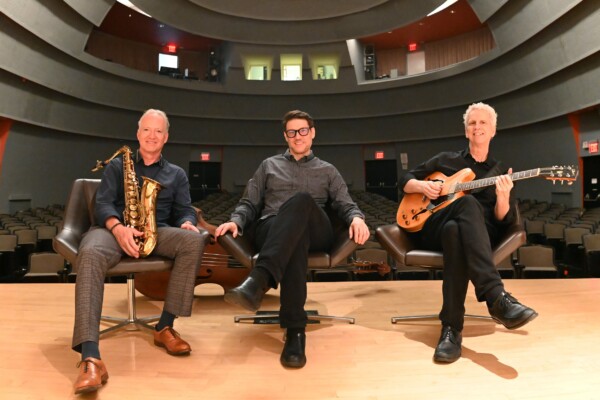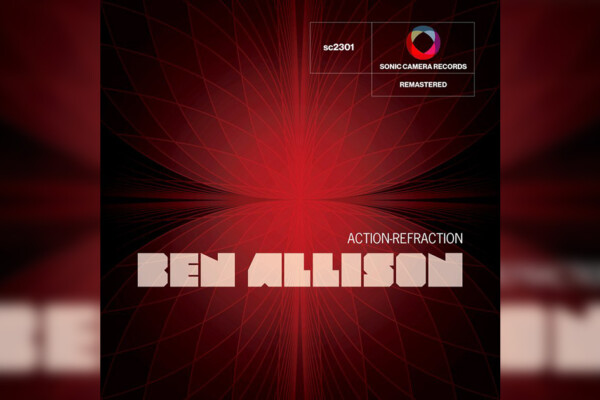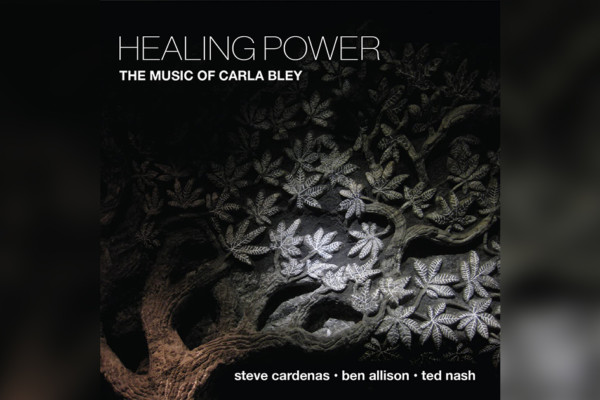Think Free: An Interview with Ben Allison
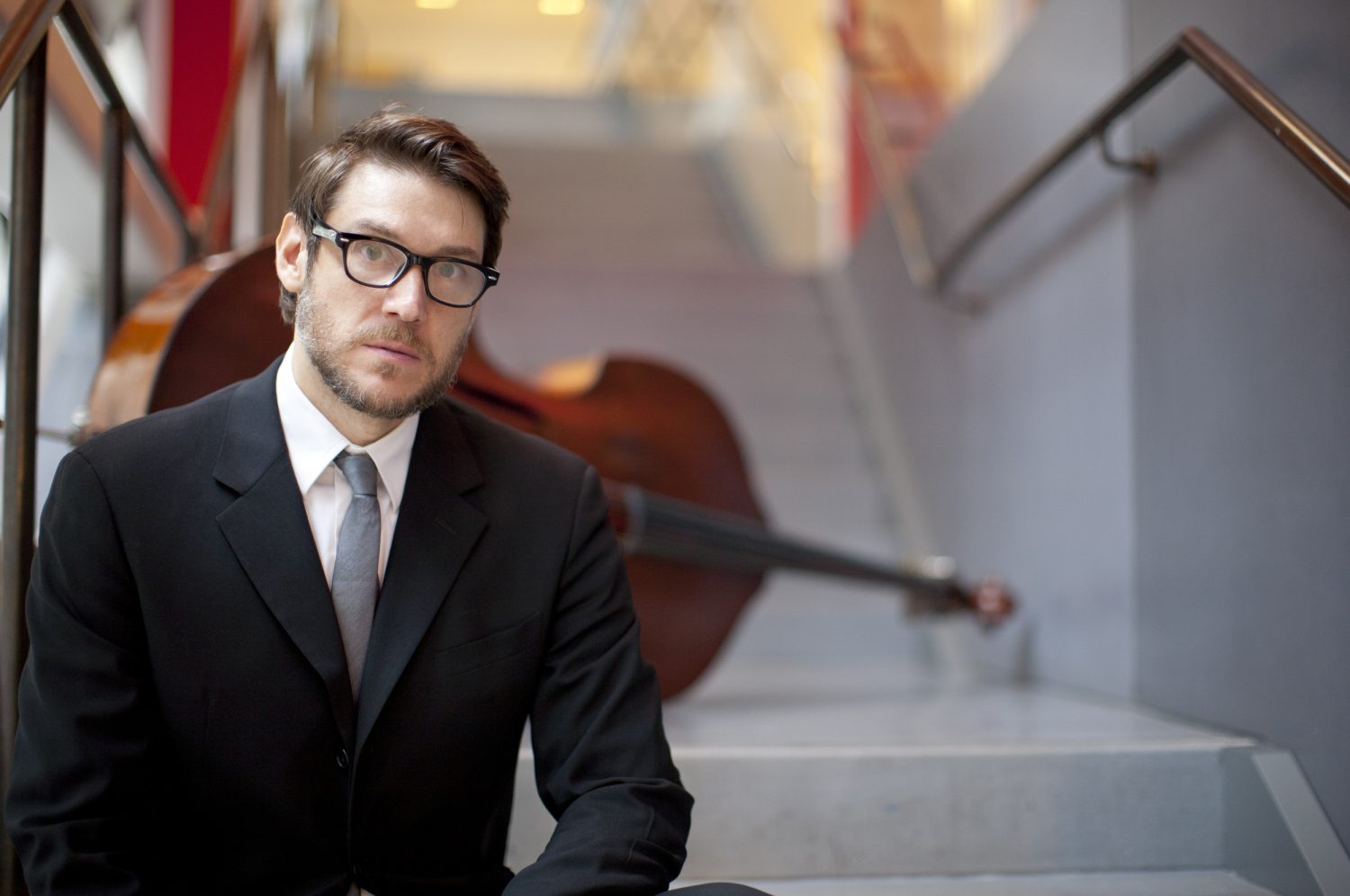
Ben Allison has had several names for his various bands, but Think Free may be one of the most apropos to his creative style. The bassist/composer crafts adventurous songs that defy simple categorization or labeling. He’s also a free-thinker in terms of forging his career path. After years of working for a record label, he branched out to create his own Sonic Camera label on which he released 2013’s The Stars Look Very Different Today.
Now Allison and Think Free are trying something new by gearing up for an album through the Pledge Music platform. Fans can help fund the project by pre-ordering the album and get unique prizes in return. Besides the album itself in digital, CD, and vinyl formats, backers can get everything from their name in the credits or signed sheet music from the recording session to more experiential rewards like a attending a rehearsal or a duo concert. Fans also get updates on the process along the way, allowing for a behind the scenes look at the bassist’s creative process.
We caught up with him to get the scoop on the Pledge Music project, the magic of vinyl, his rediscovery of the electric bass, and his recent drummer-less trio album.
You had a pretty varied musical start, so how did you get into bass?
Well, it’s a long story, but when I was a kid I played guitar and drums. I went to a great performing arts high school in New Haven, Connecticut called the Educational Center for the Arts. But it was hard to learn two instruments, and I remember feeling like I had to focus on one or the other. My ensemble instructor suggested I try bass and it just kind of clicked. The bass felt like the guitar and the drums all wrapped up into one. I got to know some great acoustic bass players in New Haven too and they turned me onto the acoustic bass. From there it was just a short jump over to New York where I immersed myself in the jazz scene pretty quickly.
I love the tonal possibilities of the acoustic bass. The electric bass is something I’m just getting back into now, but basically, my entire professional career has been spent playing acoustic.
I noticed that you were playing electric in your rehearsal video with [guitarist] Steve Cardenas, and I don’t think I’ve ever seen you play one before.
Yeah, I don’t think anyone has [laughs]. I’m starting to feel it. There’s this strange gig we started doing a couple of years ago where we go to the Philippines for a few weeks out of the year. Because of the climate and the nature of the travel required to get there and the gig itself, bringing an acoustic bass was not an option. I was thinking to myself, “Well, maybe I should try playing electric. Let me give it a shot.”
I’ve been having so much fun doing that gig hat I’m starting to enjoy playing electric again – maybe because I’m playing it through the lens of having been an acoustic bass player for so long. I was not entirely in love with the electric bass when I was younger. I was more fascinated with the acoustic bass and that percussive quality [that it gets] like a drum. [I like] the fact that acoustic basses really vibrate and there’s a lot of air that moves. There are so many sonic possibilities and you can change how it sounds by the way you pull the string. There’s just so much variety of timbre. That was fascinating to me as a kid and remains fascinating to me 35 years later.
But electric bass has a thing too. For one thing, it’s quick. You play a note and it comes out at the speed of electricity. The sound is really immediate and the tonality is very clear. And you know… it’s easy to play [laughs]. I feel like I can play all of this other stuff. I can play some of it on the acoustic too, but it’s more work.
Are you going to have any electric on the new album that you’re working on?
I think I will. I wrote a couple of the tunes, especially one the was part of that rehearsal video, on the electric. I think it’s the kind of thing that sounds better on electric and I’m not even sure if I can do it on acoustic. It involves a little bit of fingerpicking like a guitar, in a way. I’ve done things a little bit like that on acoustic, but my bass isn’t really set up to do that for real. It’s tricky to do fingerpicking on acoustic bass, but on electric it’s quite natural. I think I’ll play electric for at least that tune.
I also got this great [Ampeg] B-15 on eBay a little while ago, which just sounds so nice. It’s in perfect shape. I think it’s a ’66. It’s got such a great tone, so I’m going to bring that to the session. I just want to record with it.
It’s been about three years since your last album. What kind of led up to this one, and what’s been happening since then?
I’ve been on a pretty steady clip since the mid-90’s of releasing an album every eighteen months, all the way through 2013. Releasing an album every eighteen months for fifteen years [made me] feel like I needed a little change in direction to recharge.
I’ve been really busy playing and touring and having fun and trying all these different projects with different approaches and sounds. But you know, all the sudden three years slipped away and I was thinking, “That’s the longest I’ve ever gone [without a new album.” So I sat down to think about putting together a project and a record.
I’ve always been sort of a do-it-yourself person, but for most of my career I was on a great label called Palmetto Records. But eventually the people who were behind the label all moved on and the label was sold to another company. Then it became a different company that wasn’t appealing to me anymore from an artistic standpoint. So I started thinking about releasing my own records like a lot of artists are doing these days. It’s hard if you’re a fledgling artist to release your own record, but if you’ve got a little bit of notoriety and you’ve got a few albums under your belt, in one way it’s a little bit easier to do. I have a small but loyal fanbase, so I’m not starting from scratch.
The other positive is that you have total control over every aspect of the record, which is fantastic. I look at it all as part of the creative experience, from writing the tunes to doing the session to mixing the album and doing the artwork. I feel invested artistically in all of those stages. So it’s very rewarding, and when it does well it’s even that much more gratifying because it’s something you created yourself from the ground up. I’m really hooked on that now. I don’t know if I would do it any other way. I suppose if someone came and offered me a huge advance I might take it, but since people aren’t really doing that anymore, my approach has been to develop my own label and release my own records.
It’s empowering. A lot of record labels are challenged. They’re having a hard time. A lot of the smaller and medium labels are being consolidated into the big labels, but even those are being challenged and are trying to figure out new ways to raise revenue while production budgets are being slashed.
From the artist perspective, the question is, “What is a record label? What’s the point?” In my opinion, a record label is a company that first and foremost takes the gamble and risk by financing projects. They put the money out there. That’s what they do well. They also have infrastructure to help promote, but really promotion is something that independent agencies can do too. So if a [record company’s] budgets are being cut and they’re not taking the financial risk, they become less necessary for artists. Also, they used to be the only way to distribute music, but that’s certainly no longer the case; people can distribute music in lots of different ways these days. Meanwhile, artists are finding ways to streamline the process. They create the music and then put it out directly to the people. It’s a very direct, personal connection which I’m really enjoying. I like connecting with the people who listen to my music. Producing your own albums really helps in that regard.
And Pledge Music is another way to even more directly connect.
That’s exactly right. With the previous album, I produced it myself and was able to connect directly to people, by selling them on the bandstand and selling them on my website and Amazon and iTunes. The thing that was missing was this even more direct connection to people. What I’m finding very gratifying with this Pledge Music campaign is that the people who are interested in the album [are pre-ordering]. The mere act of pre-ordering a record is kind of amazing. They’re saying, “I’m buying your record now,” and then I make it and I send it to them. I think that’s a wonderful vote of confidence from people who like my music and it takes some of the burden off of me in terms from a financial perspective. It’s a great thing and it’s been really amazing to connect with people through this campaign, I’ve been talking with people who I haven’t spoken to in 20 years or people that have been following me for years but I’ve never actually had a conversation with. It feels much more personal and very empowering to make records this way. I’m very inspired to be creative and I feel even more connected to people that are interested in the kind of music that I make. So far it’s been great.
On the idea of creativity, do you deal with “blank page syndrome” or are you the kind of guy that gets up every day at 7 o’clock in the morning and just get to it?
I’m not the guy that writes every day. I tried that, but I didn’t find that it helped my writing. It didn’t yield better results. My style now is to assemble fragments of thoughts sporadically as they pop into my head and keep a scrap book of ideas. Some of it’s a mental – a conceptual scrap book of ideas. But I’m also a big fan of singing ideas into my iPhone as I’m walking down the street, or capturing ideas on piano and putting them into Logic. Wherever any idea comes up I’ll try to document it in some way and get a bunch of pieces together. The process of composing then, is to put the pieces together and try mixing and matching them in different configurations and orders. The process involves a bit of trial and error. I keep experimenting until things start to sound good.
There’s an intellectual process that’s essentially problem solving, For instance, how to get from point A to point B? I try something and see if that sounds right. I’m constantly going back and forth between thinking about music analytically and then just feeling it on an emotional level, using my aesthetic judgement to be sure it sounds good to me. Sometimes I don’t actually know what I’m writing. I go totally by feel and then try to figure out what it actually is from a technical standpoint. You can almost see that in that little Pledge Music video where I’ve written some stuff down and Steve Cardenas is reacting to it. At one point we start discussing what we’re going to call the harmonies [laughs]. We’re defining terms. He said, “Well, it’s really a minor chord with the sharp four but the five is there too.” Yeah, that’s what I wrote, that’s actually in the music, it’s just that we’re trying to figure out how best to notate that to convey that information. This is how music comes together.
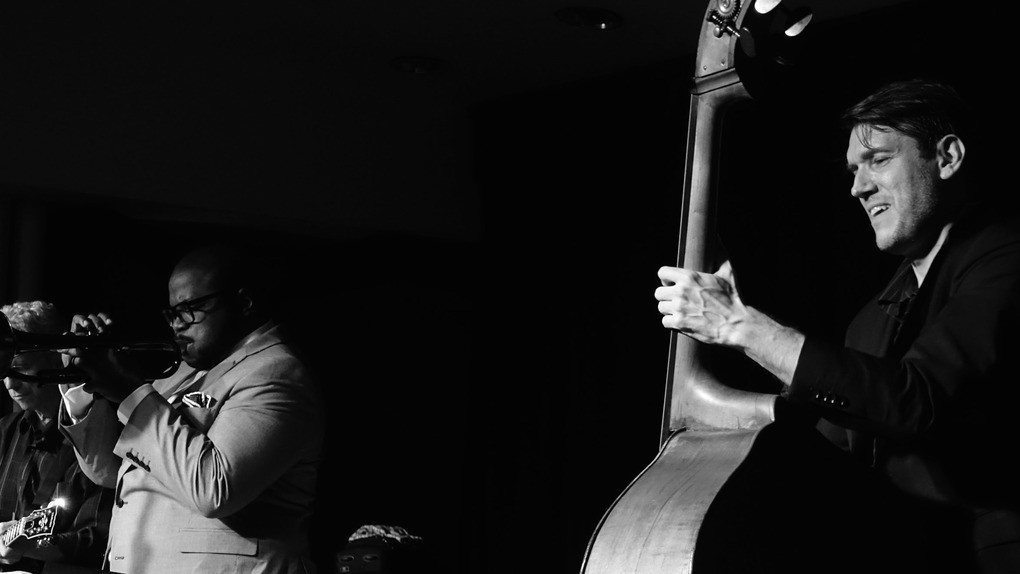
For me, the last step of the process, as I just described, is to bring it in to the cats and have them flesh it out my ideas. The way I think about it is that I create a skeleton and then they put the meat on the bones. They bring it to life, then it comes back to me and I see what I feel is really working and maybe make some small adjustments to the chart, or even which sections go where. But basically it’s a collaborative process. I always want to leave a lot of room for improvisation because, after all, I’m a jazz musician so certain things can’t be written down. The music needs to be left open so the musicians can bring their personalities to it.
That’s another interesting thing for me. You have kind of this fairly solid cast of guys you work with, but Steve, in particular, is there a lot. The first album of yours I got hip to was “Little Things Run the World”, and ever since then I think you’ve had him on all your albums. Is that right?
That’s right. The first one that he did with me was one called “Cowboy Justice”, which is the album that preceded “Little Things run the world.” You know, as I said, I came up as a jazz musician. On my early records, there were a lot of saxophones, trumpets and woodwinds and piano and sometimes cello. I was thinking more on the orchestrational side and things and my music had a lot of jazz references. By the time the mid 2000’s hit, I was starting to edge towards referencing my roots, which are more on the rock side of things. When I was a kid in New Haven, I listened to all sorts of music but I wasn’t exposed to a lot of jazz. It wasn’t in the house, it wasn’t something my parents listened to, and it wasn’t on the radio. None of my friends had any jazz records. I was not hip to it at all.
Interestingly what I did have was a great record store and record store owner. [He was] kind of a music geek. Think Jack Black from “High Fidelity.” This guy knew more about music than an ethnomusicologist at Yale. This guy knew every fucking record. I would walk in there and he would put stuff in my hand, and that’s how I learned about jazz. I would walk in and he would say, “Oh you like this? Well check this out.” He kind of got me on the trajectory. Even though I didn’t get to hear these guys live very much, I got to hear them on record. But then I realized they were only 80 miles away in New York, which is why I eventually moved there.
Do you remember some of the first couple albums he put in your hand?
Yeah. I came in and I was buying Led Zeppelin albums. He said, “Oh, you like Zeppelin? What do you like about Zeppelin?” I said, “I like the guitar and I like the way Jimmy Page shreds.” I don’t know that I used that word, but I said I liked the way he played. This is unbelievable, but the guy said, “If you like Jimmy Page, then you’ll like Pat Metheny.”
In retrospect, that doesn’t make any sense at all because Pat Metheny has very little to do with Jimmy Page. But he put a Pat Metheny album in my hand and I said, “Wow, I’ve never heard guitar played like that before.” It was extraordinary. Then Pat Metheny was talking about Ornette Coleman. So for my second record I went in and said, “Who’s this Ornette Coleman?” He gave me “This is our Music”. Which, again, has nothing to do with Pat Metheny, but in a weird way it did remind me a little bit of Zeppelin. Really, Zeppelin is the blues and Ornette is the blues. He’s country blues. The way Jimmy Page kind of sang and growled [through] his guitar, I felt like Ornette was singing with his saxophone. I had no idea what they were doing. I didn’t understand what was happening, but it felt like what I had been missing. It was what I was looking for. It in some ways it had nothing to do with what I had heard before but in other ways it felt profoundly familiar.
That’s what set me on the path. From there, I went backwards in time to Duke Ellington, then I went forward to some of the free jazz of the ‘60s. It’s weird. I’ve often felt that music from the 60’s is somehow more connected to the music of the 30s than to the bebop era. Anyway, I started diving into it all.
Sometimes I get hung up on the timeline of jazz alongside pop and rock that’s happening at the same time. It feels like two totally different worlds to me.
In a sense, they were connected. Rock records in the late ’60s were often longer form art pieces. They were albums, they weren’t singles anymore. They were about concepts, and that was reflected in jazz as well. Coltrane would play one tune that would last the entire side of the record, and “Sgt. Pepper’s” came out as a suite. It was a concept album, but it all hung together as a thing. There are definite similarities. Also, everybody started using the recording studio as an instrument around the same time.
Musicians feed each other, and I think sometimes when we look back we try to put things into categories. But really, at the time, musicians are just feeding each other and exchanging ideas, even across genres and communities. I don’t know any musicians who don’t listen to nearly everything. We get our influence from every direction now. What I choose to pull out of all the music that I hear, and what I incorporate into my own music is my own particular recipe for the stew, but we’re all talking about essentially the same ingredients. We’re just mixing and matching them in different ways.
What’s interesting to me is the people who were coming up at the same time in the 60s but who had very different approaches. For instance, I’ve been working on a project where we’re focusing on music by Jimmy Giuffre and Jim Hall. Those records were made in the late ’50s, through the ’60s and into the ’70s. In those years, jazz was often colossal and kind of aggressive, and rock was super huge with stadium-size concerts. While this was happening Jimmy Giuffre was doing this very stripped down, almost classical chamber jazz drummerless trios. As harmonies were getting denser and Wayne Shorter was stacking chords on top of each other, Jimmy was writing triadic based folk music. There was a folk scene happening for sure – in New York, especially – in the 1960s. Maybe Jimmy was tapping into that, but in retrospect he music seems almost at odds with almost everything else that was happening in jazz at the time. That’s interesting to me. I like to learn from musicians who are going against the current.
That’s awesome, and that project sounds really great. Is that album currently out on Newvelle Records? What is the release date for that?
Yes, the album is called Quiet Revolution (a reference to Jimmy and his quiet approach). Newvelle doesn’t actually have firm release dates, which is confusing, I know. They’re releasing albums as sets. They release 6 albums that hang together conceptually and offer them via a subscription. People sign up for the season and get them through the mail at regular intervals. For the producers at Newvelle, they feel these records work together to tell a complete story. You’d have to talk to the producers to learn more because I don’t know exactly how to phrase it. But the result is they don’t promote the albums as being tied to specific release dates. It’s a different model. However, you can get Quiet Revolution directly from my site.
And it’s vinyl only, right?
That’s right. It’s vinyl only, which is an interesting approach. I’m a huge vinyl fan, and you’ll see from my Pledge Music project that we’ll do a vinyl version of the new record too.
I still buy vinyl albums, I still listen to them. People talk about the sound, but that’s not what draws me to them. What draws me to vinyl is the experience. It’s the fact that they demand your attention. You put on a record and eighteen minutes later you have to flip it over. It’s the fact that, you know, they’re kind of a pain in the ass. As much as I hate cleaning records, I also kind of love cleaning records. When you put the needle down, it makes a sound. They do sound wonderful, of course, but it’s the feeling of a larger format jacket where you see pictures and you can read liner notes and see who all is on the record. The jacket itself has a feel; it’s tactile.
I look at my daughter as kind of a barometer now. She’s twelve and she’s come up in the iPhone era. She’s an avid reader. She just loves to read. Our apartment is filled with books. Years ago I asked her, “Why can’t I put all your books on the iPad?” But she refused to read on the iPad. I keep pushing it because I wanted to save space [laughs]. She said, “I don’t want to use the iPad.” So I asked her why not and why she like books so much. She said, “Books smell good.” It had never occurred to me that part of the experience of reading a book is the way they smell. It never entered my mind, but it’s so true. There’s something about reading a book. It’s not a light shining in your eye. You can flip pages back and forth easily and they smell like something. They feel like something in your hands. There’s this kind of experiential thing. To me, that’s a big part of the appeal of vinyl. They feel like a tangible object in a world where things are increasingly becoming virtual and ethereal. I think the more ethereal things get the easier it is to feel disconnected to them. I think the same is true for music.
Does your new album have a concept or theme?
I usually wait until I’ve written the music to see what themes emerge. I try not to set out with that many preconceptions. I suppose I’m the type of artist who goes mostly by instinct and blind luck [laughs].
I can say that I thought this album was going to be something last Monday. But, by Tuesday night at 11:30pm, it had become another album whether I liked it or not. I channel what’s happening. My feelings are different now after the election, so I’m sure that’s going to affect the music. The tunes that I wrote the day after the election will be part of the record.
One of the nice things about making an album is that it’s really a snapshot in time. When I listen to records, I think, “Oh yeah, I remember what I was thinking back then.” It’s not always obvious what a tune is about for the listener, especially with instrumental music that has no lyrics. But for me I absolutely remember where I was and what I was feeling and thinking at the time I record an album.
That’s another great thing about this Pledge Music. People are seeing and hearing it as the record is coming together. In fact, I think I can turn this project around quickly. So from the moment we record to when the record is in the listener’s hands is going to be a short time. Shorter than what a label would normally require. I think the music is going to feel even more immediate, which is great. It’s another example of the kind of direct connection this platform allows.
Do you have an estimated time of when it will be out?
The only thing that could possibly delay it a little bit is that we’re touring so much. Basically three days after we make the record, Steve and I are going to be gone until about mid March. The beauty of it is that I can do a lot of the work on the road. It’s amazing how much you can do on a laptop. I mixed my last album myself and I did it all in the box, as they say. I did it all digitally. I think it’s totally cool to do that now. You can get great sounds as long as during the mastering phase you do it correctly, in a nice studio where you can hear any potential problems that you may not have caught otherwise. But I can do the main mixing in the box. I’m going to mixing this album on planes and boats and in hotel rooms. That’s my plan [laughs].

